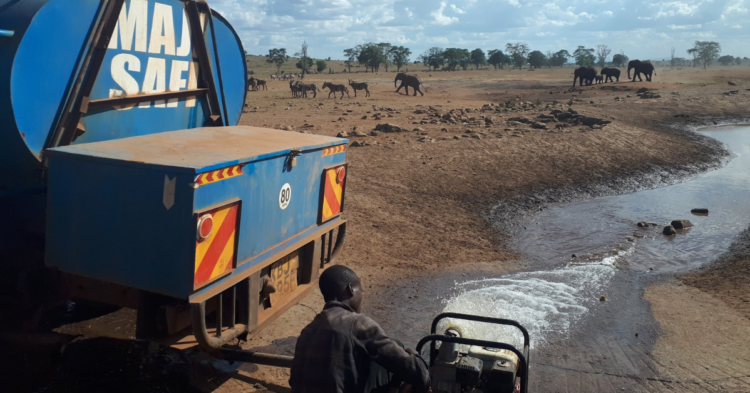Water is a basic necessity of life. So when an area is afflicted with drought, it isn’t just humans that are threatened — it’s every living thing in the area. Fortunately, in at least one case, a remarkably generous act is helping thirsty animals.
Kenya’s been hit hard by droughts.

One such area is Tsavo West National Park . The 3,500 square-mile nature reserve is home to a wide variety of animals, including rhinos, hippos, elephants and lions. Recent droughts have left many of these animals struggling to survive.
A local farmer decided to help.

Patrick Kilonzo Mwalua , a pea farmer, mobilized a group of volunteers to help out. With his small team, he brings thousands of gallons to the park a few times a week.
Their lives depend on it.

“There is completely no water, so the animals are depending on humans,” he said . “If we don’t help them, they will die. He didn’t ever set out to do this, but got the idea after seeing how dry the park was.
It’s been a runaway success.

The mission to supply thirsty animals with drinking water resonated, and Mwalua eventually set up a foundation, Mwalua Wildlife Trust , to keep their animal-hydration efforts organized and get the word out.
The animals know him by now.

He said that some of the beasts, notably big herds of wild buffalo, have gotten used to his water deliveries and will eagerly wait for his next arrival.
He does it with a special truck.

The tanker trucks fill up with fresh drinking water in the town of Voi, about 45 miles away from the park entrance. From there, they go inside the park and start delivering the water.
Ride-alongs are possible.

Mwalua notes on his website that there’s a possibility that anyone curious (and brave enough) might be able to ride along for one of these water deliveries, depending on the season.
They have to get the most out of the water they have.

Because those trucks can only cram so many gallons in them, it’s crucial that the water goes toward rehydrating thirsty animals. To ensure this, Mwalua uses these big concrete water pans.
It’s like a giant water dish.

They’ve built two of these big water pans already, and hope to build 20 total. These dishes keep water from seeping into the ground, which ensures that it’s drinkable for a longer time.
They plan ahead.

Mwalua and his team have brought excavators into the park to dig deep holes into the hard ground. These act as underground reservoirs and provide a long-lasting source of water.
They collect what little rain there is.

They’ve plotted out the best spots to put these holes, so that when there is a rainstorm, the runoff will run directly into them. It’s estimated that they can store rainwater for three to six months after a rainfall.
Keeping it renewable.

Because some of the facilities will inevitably require power, Mwalua is working on a solution that uses clean energy. These solar panels provide green energy to the park, and don’t make the disruptive racket of gasoline generators.
Clean energy is already doing wonders.

Known as solar pumps, the Mwalua Trust has already installed two in the park. These solar powerhouses can pump 60,000 litres of water from the ground into access tanks every day.
There’s even more.

Dishes, solar energy and underground holes are all good for keeping the park hydrated, but the Trust is also working on creating big concrete water tanks to store even more water.
What a story!

It’s pretty incredible that this whole initiative was inspired by one man’s chance observation at the park.
Make sure to check out Mwalua Wildlife Trust , as well as Patrick’s Facebook account to stay in the loop.

















































